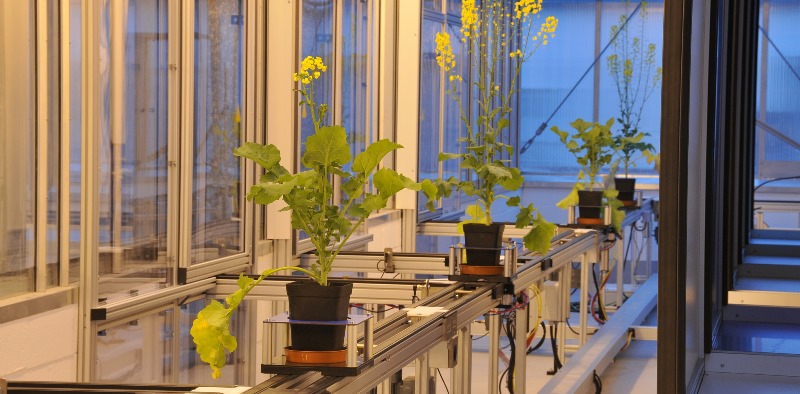BRAVO - optimising the performance of brassica crops

Rapeseed plants being scanned in the BBSRC funded National Plant Phenomics Centre at IBERS Aberystwyth University.
12 January 2017
Aberystwyth University’s Institute of Biological, Environmental and Rural Sciences (IBERS) is a lead partner in a new 5-year project aimed at combating the losses experienced by two of the UK’s most economically valuable vegetable crops.
Oilseed rape and Brassica crops have a combined UK market value in excess of £1bn, but suffer annual losses of up to £230m, primarily due to increasingly unfavourable and unpredictable weather patterns.
The ‘Brassica Rapeseed and Vegetable Optimisation’ programme (BRAVO), funded by the Biotechnology and Biological Sciences Research Council (BBSRC), aims to combat these crop losses by unravelling the processes that control key aspects of plant development.
This knowledge will then be applied to help develop new, more resilient varieties of Brassica crops that can achieve superior field performance whilst reducing yield loss and industry wastage.
The BRAVO project, led by Professor Lars Østergaard of the John Innes Centre (JIC), brings together the expertise of leading UK plant scientists from three research institutes - JIC and Rothamsted Research and the Institute of Biological, Environmental and Rural Sciences at Aberystwyth University and the universities of Nottingham, Bath, Warwick and York.
They will be collaborating with representatives from the oilseed and horticultural industries.
Professor John Doonan, Director of the BBSRC funded National Plant Phenomics Centre at IBERS said: “Producers need improved resilience to adverse environmental conditions to cope with the combination of climatic variability and the increasingly stringent delivery time and quality requirements imposed by the food industry.
“IBERS will apply state of the art bio-medical imaging and computer-vision approaches to reveal and exploit the diversity available in these crops, making the food supply chain more efficient and robust.”
Environmental conditions influence a number of key stages of plant development including inflorescence growth, flowering, fertilisation and seed production. In the face of climate change, it is more important than ever that our crops are capable of tolerating rapidly changing environmental conditions while still maintaining good vigour and achieving consistently high yields.
Discussions between BBSRC BRAVO consortium members and industrial stakeholders identified a number of strategic targets sensitive to such changing weather patterns. These include more concise flowering, consistently high fertility under fluctuating environments, reduced yield loss and more uniform seed performance.
As well as improving the fundamental understanding of how Brassica crops grow and respond to the environment, the £4.4 million BBSRC BRAVO project will support the training of young scientists and raise industry stakeholder awareness of new developments through workshops in Brassica genetics, genomics, phenotyping and modelling.
Professor Lars Østergaard said: “As our climate changes and the global human population is predicted to exceed 9 billion people by 2050, it is more important than ever that our crops are able to grow and produce as much food as possible in varying weather conditions and season lengths. By unravelling and exploring the processes behind important genetic traits in crops, we will provide a basis for the development of improved Brassica crops that reduce losses and withstand changes in climate and environmental conditions.”
BBSRC’s Strategic Longer and Larger (SLoLa) grants support integrated research projects requiring long timescales, extensive resources and multidisciplinary approaches.
Supported projects must be scientifically excellent, demonstrate exceptional relevance to one or more of BBSRC’s strategic priorities, an understanding of the potential for impact and be conducted by an internationally leading research team.
BBSRC’s Head of Agriculture and Food Security, Dr Adam Staines added:
"This proposal addresses a number of key BBSRC research priorities. Making UK crops more resilient to our changing climate is key to maintaining future productivity and reducing food waste. This group is building on past investments in basic plant science and translating this knowledge to key UK crops, working with the relevant industry to deliver real potential long term benefits for UK farmers. "



